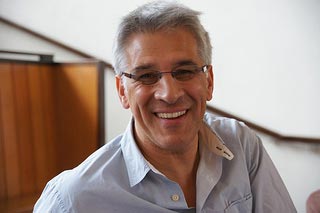Big Society Opportunities
One of the Assembly day conferences looked at the challenges and opportunities for churches in the Big Society
It was entitled ‘Whose big idea?’ and while many people seem to think that the ‘Big Society’ was David Cameron’s big idea, it was clear Steve Chalke (pictured), MBE and founder of the Oasis Trust, was already there.
The conference was hosted at his church - Oasis Church - in Waterloo. ‘The trickle of public services coming under the control of third sector organisations will turn into a stream’, he said ‘and the stream will become a torrent.' Successive governments, he explained, of whatever colour, realise that they can no longer raise the funds to run the services. Instead of being a manager, the Government will become an administrator, commissioning independent organisations and directing them to where they are needed.This gives churches and Christians everywhere an opportunity to get involved and engaged in life around them, to go out and create that wondrous thing called ‘community’.
Steve certainly practises what he preaches. Throughout the day he told us of the Oasis community Hub in Waterloo.

It started with a small coffee shop run by volunteers in the church foyer. They had one telephone between them and Steve was living in a one bedroom flat with a mattress on the floor.
Now, the hub runs a food bank, a debt advice centre, youth groups, sports and athletics clubs, and several academy schools. It has employed people who cannot find a job elsewhere, and directed those who are looking to volunteer to opportunities waiting to be filled.
The hub is run by a group of leaders, each of whom are responsible for their own department, but together they are working to fulfil a vision that in 2020, the poverty-stricken, depressed Lambeth/Waterloo area will be voted the UK’s most desirable place to live. They have even produced some mock news pages in preparation for that great day.
Multiply all this by eight - the number of hubs set up across the country - and you see an interesting version of the much talked about Big Society.
But Steve was offering something more than that: he was presenting an interesting picture of what a modern church can be.
The congregation need not, he said, confine itself to singing hymns, for that is not likely to draw people in. Nor need the members spend too much time working out where they disagree on obscure points of doctrine.
Instead the church could step outside into the local area, and seek to work with the people around them - and include them all in the list of people it considers ‘members’.
Jonathan Barr is a researcher in the Baptist Union of Great Britain's Faith and Unity department